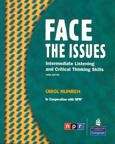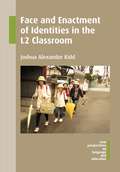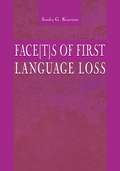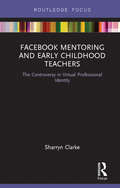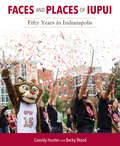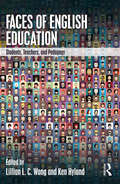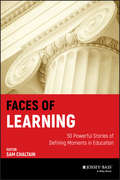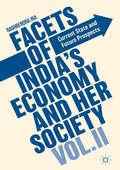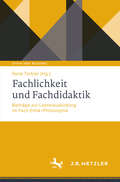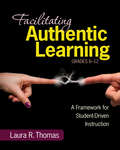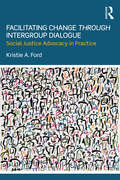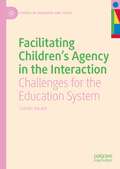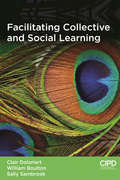- Table View
- List View
Face The Issues: Intermediate Listening And Critical Thinking Skills
by Carol Numrich National Public Radio (U.S.) StaffFace the Issues: Intermediate Listening and Critical Thinking Skills, Third Edition, by Carol Numrich, in cooperation with NPR®, helps intermediate students develop critical thinking skills as they gain insight into American attitudes and values. Each thought-provoking unit is based on an authentic radio broadcast from National Public Radio®. Students develop essential listening strategies such as predicting, looking at language, understanding main ideas and points of view, and focusing on details. Language and concepts are integrated through follow-up critical thinking activities including discussion, debate, values clarification, survey, role play, case study, inteview, and simulation.
Face and Enactment of Identities in the L2 Classroom
by Joshua Alexander KiddThis book examines student identities as revealed through the pragmatics of face as observed in the context of English L2 classroom interaction between Japanese students and a native speaker teacher. Classroom recordings together with retrospective interviews reveal specific points during learning activities when the students and their teacher s interpretations of classroom communication deviate from what was intended. This research study is a potent reminder that what students and teachers may consider as standard and conventionally acceptable language use and behaviour within the classroom context can differ dramatically according to social, cultural and individual frames of reference. The book outlines an innovative teacher professional development program which encourages teachers to reflect on and, where desired, modify or discontinue existing pedagogic practices. "
Face the Dragon
by Joyce SweeneyOn his first day of high school, a boy must confront his fears As soon as he wakes up, Eric senses doom on the horizon. A bright fourteen-year-old, he has been fast-tracked from junior high to the tenth grade, and he is terrified. The only thing saving him from panic is the knowledge that Paul, his best friend since childhood, will be by his side. Where Eric is scared of the unknown, Paul is fearless and seems capable of anything. But neither of them is ready for what's in store. Eric attempts to leave his comfort zone, trying out for sports teams and joining the debate club, but the sadistic debate coach, Mr. Drake, is intent on destroying the young boy's confidence. Eric is paralyzed by his fears until he encounters the story of the brave knight Beowulf, who encourages him to put worry aside and embrace the warrior within.
Face to Face: Praying the Scriptures for Spiritual Growth (Face To Face / Spiritual Growth Ser.)
by Kenneth BoaWhen you're serious about following Christ, you long to become more like Him. You also know that the Bible contains the life-changing truths that will help you reach that goal. Face to Face: Praying the Scriptures for Spiritual Growth helps you turn your devotional times into a daily experience of transformation. Adapting and personalizing select Bible passages, Dr. Kenneth Boa offers you a refreshing and encouraging way to "renew your mind" as you meditate on and pray about: the attributes of God, the works of God, my relationship with God, the character I want to cultivate, my relationship with others. This inspiring approach will change both your life and the way you view the Scriptures. Prepare to discover the Bible afresh as a marvelous source of prayer and reflection that enables you to love God completely, love yourself correctly, and love others compassionately. Face to Face prayer books help you bring new richness to your devotional times. By connecting Bible reading with personal prayer, they help you approach both in a new way. Get ready to rediscover the Bible as your most treasured prayer book-guiding you into prayers that are alive, faith-filled, and powerful because they're grounded in God's word.
Face[t]s of First Language Loss
by Sandra G. KouritzinThis book contributes to the understanding of first-language loss in both immigrant and indigenous communities in (at least) three ways. First, it provides insight into the process of language loss and the factors contributing to it. Second, it attempts to define, from an insider perspective, what it means to "lose" a language. Third, it analyzes the perceived consequences of first language loss in terms of social, academic, emotional, and economic factors--an approach previously lacking in research on language loss. Most studies of first language loss are impersonal, even when they tell emotional stories. This polyphonic book about language loss and imperfect learning of heritage languages tells the inside story. Easy to read and yet academic, it gives voice to five different storytellers who relate the histories of their first language loss and analyzes themes from 21 life-history case studies of adults who had lost their first languages while learning English. The stories in this book make a compelling argument that heritage languages should be preserved, that ESL should be about developing bilinguals not English monolinguals. Important reading for researchers, practitioners, and graduate students in ESL and bilingual education, multicultural education, cultural studies, and sociology, this book will also interest qualitative researchers as an example of a unique form of both doing and writing research.
Facebook Mentoring and Early Childhood Teachers: The Controversy in Virtual Professional Identity (Routledge Research in Early Childhood Education)
by Sharryn ClarkeThis volume explores concepts of mentoring, leadership and issues faced by early childhood teachers. Foregrounded against inadequate leadership and mentoring training in this sector, this book looks at how mentoring is exercised through Facebook. Mentoring through Facebook provokes a strong sense of freedom in terms of speech and influence. The benefits for using social media in mentoring includes minimizing costs and reaching mass numbers of mentees globally where knowledge can be shared and information gained. Whilst there is also a positive and active approach to mentoring, there is the danger of mentoring that misinforms, disempowers and alienates. This book will help active players in the early childhood sector in understanding the crucial nature of mentoring and its impact when used through Facebook and similar social media sites.
Faces and Places in America
by Deborah J. Short Tomas Fernandez Tony BonaventureNIMAC-sourced textbook
Faces and Places of IUPUI: Fifty Years in Indianapolis (Well House Books)
by Cassidy Hunter Becky WoodTo celebrate its 50th anniversary, Faces and Places of IUPUI: Fifty Years in Indianapolis presents the story of the Indiana University—Purdue University Indianapolis campus in a new and unique way. With a focus on the "Fifty Faces of IUPUI," a select group of students, faculty, staff, alumni, and community members chosen by the campus, readers will learn how the campus developed out of the Indiana University School of Medicine in 1903 to become Indiana's premier urban public research university. From remarkable figures from the past such as Joseph T. Taylor, who grew up in the Jim Crow South and later became the Founding Dean of the School of Liberal Arts at IUPUI, to current undergraduates from a multitude of backgrounds and studying a range of disciplines, Faces and Places of IUPUI recounts the fascinating people who help make IUPUI a national and international leader in education and research. Using a combination of archival and contemporary photography, Faces and Places of IUPUI captures these stories and weaves them together to represent the university's evolution.By taking readers through the past and present, and leading them toward the future, this volume conveys the spirit of the 50th anniversary, as well as the impact that the IUPUI campus has made in its first 50 years.
Faces of Discrimination in Higher Education in India: Quota policy, social justice and the Dalits (Routledge Research in Educational Equality and Diversity)
by Samson K. OvicheganThis book illuminates the experiences of a set of students and faculty who are members of the Dalit caste – commonly known as the ‘untouchables’ – and are relatively ‘successful’ in that they attend or are academics at a prestigious university. The book provides a background to the study, exploring the role of caste and its enduring influence on social relations in all aspects of life. The book also contains a critical account of the current experiences of Dalit students and faculty in one elite university setting – the University of Shah Jahan (pseudonym). Drawing on a set of in-depth semi-structured interviews, the empirical study that is at the centre of this book explores the perceptions of staff and students in relation to the Quota policy and their experiences of living, working and studying in this elite setting. The data chapters are organised in such a way as to first explore the faculty views. The experiences of students are then examined with a focus on the way in which their caste is still an everyday part of how they are sometimes ‘othered’. Also, a focus on female Dalit experiences attempts to capture the interconnecting aspects of abject discrimination in their university life. Faces of Discrimination in Higher Education in India explores: critical exploration of the Quota System policy and related social justice issues; faculty voices: Quota, caste and discrimination; students’ perceptions and experiences of the Quota policy; being a ‘female Dalit’ student; positioning caste relations and the Quota policy: a critical analysis. This study will be of interest to educational sociologists examining policies in education and analysts of multicultural and South Asian studies. It will also steer pertinent discussions on equality and human rights issues.
Faces of English Education: Students, Teachers, and Pedagogy
by Ken Hyland Lillian L. C. WongFaces of English Education provides an accessible, wide-ranging introduction to current perspectives on English language education, covering new areas of interest and recent studies in the field. In seventeen specially commissioned chapters written by international experts and practitioners, this book: offers an authoritative discussion of theoretical issues and debates surrounding key topics such as identity, motivation, teacher education and classroom pedagogy; discusses teaching from the perspective of the student as well as the teacher, and features sections on both in- and out-of-class learning; showcases the latest teaching research and methods, including MOOCs, use of corpora, and blended learning, and addresses the interface between theory and practice; analyses the different ways and contexts in which English is taught, learned and used around the world. Faces of English Education is essential reading for pre- and in-service teachers, researchers in TESOL and applied linguistics, and teacher educators, as well as upper undergraduate and postgraduate students studying related topics.
Faces of Geometry. From Agnesi to Mirzakhani (Lecture Notes in Networks and Systems #88)
by Paola Magnaghi-Delfino Giampiero Mele Tullia NorandoThe volume reports on interdisciplinary discussions and interactions between theoretical research and practical studies on geometric structures and their applications in architecture, the arts, design, education, engineering, and mathematics. These related fields of research can enrich each other and renew their mutual interest in these topics through networks of shared inspiration, and can ultimately enhance the quality of geometry and graphics education. Particular attention is dedicated to the contributions that women have made to the scientific community and especially mathematics. The book introduces engineers, architects and designers interested in computer applications, graphics and geometry to the latest advances in the field, with a particular focus on science, the arts and mathematics education.
Faces of Geometry: II Edition (Lecture Notes in Networks and Systems #172)
by Paola Magnaghi-Delfino Giampiero Mele Tullia NorandoThe volume reports on interdisciplinary discussions and interactions between theoretical research and practical studies on geometric structures and their applications in architecture, the arts, design, education, engineering, and mathematics. These related fields of research can enrich each other and renew their mutual interest in these topics through networks of shared inspiration, and can ultimately enhance the quality of geometry and graphics education. Particular attention is dedicated to the contributions that women have made to the scientific community and especially mathematics. The book introduces engineers, architects and designers interested in computer applications, graphics and geometry to the latest advances in the field, with a particular focus on science, the arts and mathematics education.
Faces of Learning: 50 Powerful Stories of Defining Moments in Education
by Sam ChaltainEveryone has a personal learning story, a time when they became actively engaged in their own education. Maybe it was an especially challenging teacher, or a uniquely supportive environment, or a collaborative classroom. In Faces of Learning, both well-known public figures, such as Arne Duncan and Al Franken, and ordinary Americans recall the moments when they truly learned something. Includes stories from people of all different backgrounds and from all over the country The stories are grouped into categories by theme like "relevant" and "experiential" to help reveal the common characteristics of what works in education Each chapter ends with five things you can do to improve your own learning, that of your students, and of all Americans Readers can visit the companion website www.facesoflearning.net to share their own stories of educational success and find out what else they can do.
Facets of India's Economy and Her Society Volume II: Current State And Future Prospects
by Raghbendra Jha‘Jha is the right scholar and economist to take readers through the development of the Indian economy. Readers will be in good hands.’—Edmund Phelps, Columbia University, USA, and winner of the 2006 Nobel Prize in Economics‘This is perhaps the best and most scholarly contribution to understanding the Indian Economy and Society. Its rich historical perspective and a profound understanding of how India has evolved into a major economic power set standards of scholarship and analytical rigour that will be hard to surpass". —Raghav Gaiha, University of Manchester, UK‘Linking of economy and society is increasingly recognised as essential for addressing policy challenges by the current phase of globalisation. As such this study should be valuable not just for those studying India, but also for those interested in global developments.’—Mukul Asher, National University of Singapore, Singapore‘This book is a tour-de-force review of the fundamental topics on the Indian political economy and society that are relevant for any committed social scientist to be aware of.’—Sumit K. Majumdar, University of Texas at Dallas, USA ‘Over the years, I have benefited from reading the works of Professor Jha, and from teaching from them. I enthusiastically recommend these two volumes.’ —Raaj Kumar Sah, University of Chicago, USAThis two-volume work provides an account of how India has been meeting its myriad of economic, political and social challenges and how things are expected to evolve in the future. Despite enormous challenges at the time of independence, India chose to address them within a secular, liberal, democratic framework, which guaranteed several fundamental rights. Challenges included intense mass poverty and hunger, very poor literacy and educational abilities of the population, the task of uniting a country with scores of languages and ethnicities ruled by different entities for decades and persistent threats of external aggression, to name just a few. Over time, incomes and opportunities have expanded enormously and India has regained her self-confidence as a nation. In this second volume, Jha examines the performance and prospects for India’s agriculture, manufacturing and services sectors. In addition, India’s links with the external world through international trade, investment, migration and remittances are discussed, as well as gender issues, inter-community relations and India’s future prospects.
Facetten des Vertrauens und Misstrauens: Herausforderungen für das soziale Miteinander
by Martin K. W. SchweerDer Band stellt den aktuellen Forschungsstand zu dem gesellschaftlich hochrelevanten Themenkomplex um Vertrauen und Misstrauen zusammen. In Forschung und Transfer zeigt sich, welche wertvollen Beiträge die diesbezügliche Forschung leistet, wenn es um die Lösung konkreter sozialer Probleme und um die Bewältigung gesellschaftlicher Herausforderungen geht.
Fachdidaktik Chemie in Theorie und Praxis
by Bernhard F. Sieve Jürgen Paul Sascha SchanzeSind Sie angehende Chemielehrkraft im Studium, im Referendariat oder haben Sie den Weg des Quereinstiegs gewählt und suchen nach einem Lehr- und Arbeitsbuch, das Ihnen einen fundierten Einblick in die aktuelle forschungsbasierte und praxiserprobte Chemiedidaktik liefert? Dann halten Sie mit der Fachdidaktik Chemie in Theorie und Praxis genau das passende Buch in den Händen. Auf der Basis aktueller Forschungsergebnisse aus nationalen und internationalen Studien werden wesentliche Aspekte zum Lehren und Lernen von Chemie vermittelt und daraus konkrete, evidenzbasierte Folgerungen für die Planung, Durchführung und Reflexion von Chemieunterricht abgeleitet. Jedes Kapitel wurde im Tandem aus Fachdidaktiker:innen und Chemielehrkräften entwickelt, um die chemiedidaktische Theorie eng mit der realen Unterrichtpraxis zu verschränken. Die Fachdidaktik Chemie in Theorie und Praxis ist ein Lehr- und Arbeitsbuch: Eine authentische Lehr-Lernsituation aus dem Chemieunterricht oder der Lehrkräftebildung holt Sie als Leser:innen ab und macht die Relevanz des jeweiligen Kapitelthemas für den Chemieunterricht und die Lehrkräftebildung deutlich. Gleichzeitig ergeben sich aus den Situationen Leitfragen, die die Kernaspekte des jeweiligen Themas umspannen. Übungs- und Reflexionsaufgaben regen in jedem Kapitel zur individuellen inhaltlichen Auseinandersetzung mit dem Thema an und unterstützen Ihre Selbstreflexion. Lösungshinweise zu den Aufgaben finden sich im Onlinematerial. Erprobte Praxisbeispiele und Praxistipps konkretisieren theoretische Ausführungen und unterstützen Sie bei der Gestaltung und Reflexion Ihres eigenen Chemieunterrichts. Ein großer Fundus an erprobten und evaluierten Onlinematerialien ergänzt die Praxisbeispiele. Fachdidaktik Chemie in Theorie und Praxis – ein Muss in der fachdidaktischen Ausbildung und für jede Chemielehrkraft.
Fachdidaktik Sport: Grundlagen und Modelle (Basiswissen Lernen im Sport)
by Nils NeuberDer Band gibt eine Übersicht über fachdidaktische Grundlagen und Modelle im Sport. Ausgehend von soziokulturellen Rahmenbedingungen und pädagogischen Grundlagen von Bewegungs-, Spiel- und Sportangeboten für Kinder und Jugendliche werden sportdidaktische Modelle und Konzepte vorgestellt. Es folgen Überlegungen zu Methoden im Sportunterricht sowie zur Individuellen Förderung im Sport als einem integrativen Konzept. Insgesamt zielt das Lehrbuch auf allgemeine Voraussetzungen des Sportunterrichts.
Fachdidaktische Konzepte Sport II: Themenfelder und Perspektiven (Basiswissen Lernen im Sport)
by Nils NeuberDas Lehrbuch gibt eine Übersicht über fachdidaktische Konzepte im Bereich der Entscheidungsfelder von Bewegungs-, Spiel- und Sportangeboten für Kinder und Jugendliche. Einleitend wird ein Überblick über allgemeine fachdidaktische Konzepte gegeben. Den Schwerpunkt bilden spezielle Konzepte zu Themenfeldern und Perspektiven des Sportunterrichts. Der Aufbau orientiert sich an den sechs Pädagogischen Perspektiven Eindruck, Ausdruck, Wagnis, Leistung, Soziales und Gesundheit.
Fachdidaktische Konzepte Sport: Zielgruppen und Voraussetzungen (Basiswissen Lernen im Sport)
by Nils NeuberDer Band gibt eine Übersicht über fachdidaktische Konzepte im Bereich der Voraussetzungen von Bewegungs-, Spiel- und Sportangeboten für Kinder und Jugendliche. Einleitend wird ein Überblick über allgemeine fachdidaktische Konzepte gegeben. Den Schwerpunkt bilden spezielle Konzepte zu den Voraussetzungen von Schülerinnen und Schülern, die in vier Kapiteln vorgestellt werden: Kinder, Jugendliche, Mädchen und Jungen sowie Heterogene Zielgruppen. Hinzu kommen die Voraussetzungen von Lehrkräften sowie von Bewegung, Spiel und Sport in der Schulentwicklung.
Fachlichkeit und Fachdidaktik: Beiträge zur Lehrerausbildung im Fach Ethik/Philosophie (Ethik und Bildung)
by René TorklerDer Band versammelt Beiträge zum Verhältnis von Fachdidaktik und Lehrerausbildung im Fach Ethik/Philosophie. Dabei kommen Perspektiven aus mehreren deutschen Bundesländern, Österreich sowie der Schweiz zu Wort und auch Unterschiede zwischen verschiedenen Schulformen werden in den Blick genommen. Inhaltlich befassen sich die Beiträge vor allem mit der Bedeutung der Fachlichkeit für die philosophisch-ethische Lehrerbildung, dem Verhältnis von philosophischer und fachdidaktischer Reflexion sowie der Rolle von Empirie und Wissenschaft für die fachdidaktische Ausbildung von Lehrerinnen und Lehrern.
Facial Expressions: A Visual Reference for Artists
by Mark SimonAll artists are tired of persuading their nearest and dearest to look sad...look glad...look mad...madder...no, even madder...okay, hold it. For those artists (and their long-suffering friends), here is the best book ever. Facial Expressions includes more than 2,500 photographs of 50 faces--men and women of a variety of ages, shapes, sizes, and ethnicities--each demonstrating a wide range of emotions and shown from multiple angles. Who can use this book? Oh, only every artist on the planet, including art students, illustrators, fine artists, animators, storyboarders, and comic book artists. But wait, there's more! Additional photos focus on people wearing hats and couples kissing, while illustrations show skull anatomy and facial musculature. Still not enough? How about a one-of-a-kind series of photos of lips pronouncing the phonemes used in human speech? Animators will swoon--and artists will show a range of facial expressions from happy to happiest to ecstatic.From the Trade Paperback edition.
Facilitating Authentic Learning, Grades 6-12: A Framework for Student-Driven Instruction
by Laura L. ThomasYour single-best way to nurture higher-order thinking With all the pressure to accelerate instruction, how can we possibly find the time to encourage students to do some serious thinking? With Facilitating Authentic Learning, Laura Thomas provides the answer: through constructivist, experiential teaching methods. Grade 6–12 teachers will learn how to: Plan learning experiences that teach content and process at the same time Assess students' development of 21st-century skills Coach students to do the hard work of authentic learning while providing support Teach reflection techniques that help students learn from experiences and mistakes
Facilitating Change through Intergroup Dialogue: Social Justice Advocacy in Practice
by Kristie A. FordIn order both to prepare for an increasingly diverse society and to help students navigate diverse learning environments, many institutions of higher education have developed programs that support student learning and competencies around inter- and intra-group relations. Facilitating Change through Intergroup Dialogue: Social Justice Advocacy in Practice traces the impact of Intergroup Dialogue (IGD) courses on peer-facilitators who delivered Skidmore College’s IGD curricula over a five-year period. Through a series of in-depth qualitative interviews and auto-ethnographies, this book explores how former IGD facilitators are applying what they learned to their personal and professional lives three to five years post-college. By exploring facilitators' application of IGD skills, understanding of social justice, and the challenges inherent in this work, Facilitating Change through Intergroup Dialogue offers concrete strategies for supporting undergraduate students in their enduring efforts towards justice.
Facilitating Children's Agency in the Interaction: Challenges for the Education System (Studies in Childhood and Youth)
by Claudio BaraldiThis book analyzes children's agency as interactional achievement in formal and informal contexts of education and illuminates how agency can be encouraged and supported in these educational contexts. Taking a sociological approach, the author deals with children as social agents rather than learners and considers structures of interaction which encourage and support agency, rather than teaching. The book draws from field research conducted over more than twenty years in a variety of Italian and international contexts. This book is unique in providing a theoretical reflection on the social structures that can support children’s agency, as well as a large amount of examples which show how these structures and agency work.
Facilitating Collective and Social Learning
by Clair Doloriert William Boulton Sally Anne SambrookFacilitating Collective and Social Learning is the essential text for any students studying Learning & Development (L&D) as part of undergraduate or postgraduate courses, and is the supporting text for the CIPD level 5 Unit 5CSL. It will develop your understanding of collective and social learning within the workplace by identifying and exploring what we mean by the terms ‘collective’ and ‘social’, explaining the use of collective over group, collaborative and co-operative learning, and consider the implications of this for L&D and HRD practitioners and their practice. The authors describe the emergent manifestations of collective and social learning within the workplace, and introduce and assess different theoretical models. You will explore the key current social media and e-learning tools, technologies and their applications for L&D, and how social media and e-learning tools can be employed to meet organisational learning objectives.Ideal for professionals looking to further their understanding of the field, you will learn how collective and social learning can support your organisation in achieving its L&D goals and wider business objectives. Easy to navigate and clearly written, Facilitating Collective and Social Learning will provide you with the solid grounding in the theory so that you can apply and benefit from it in practice.
